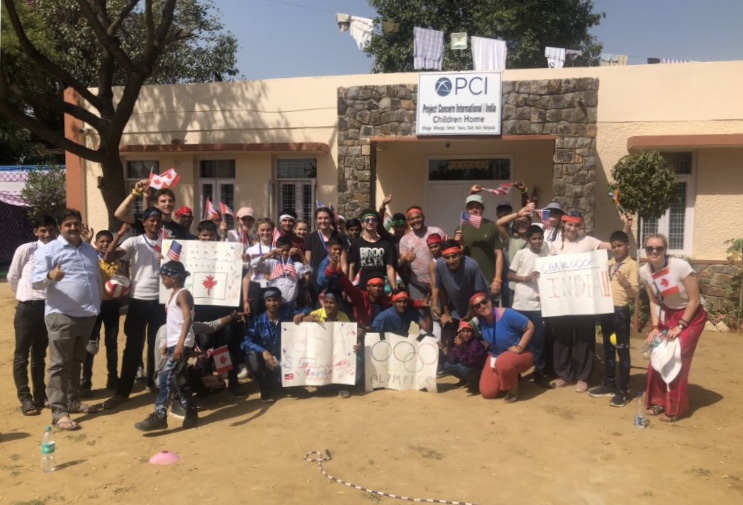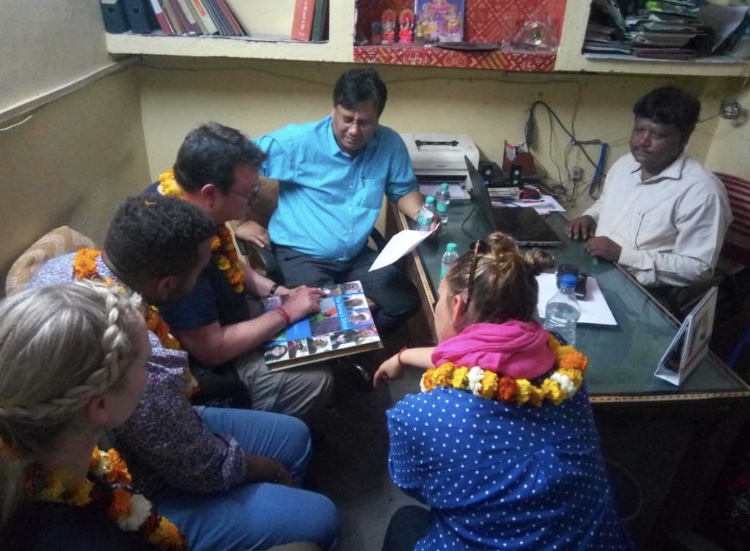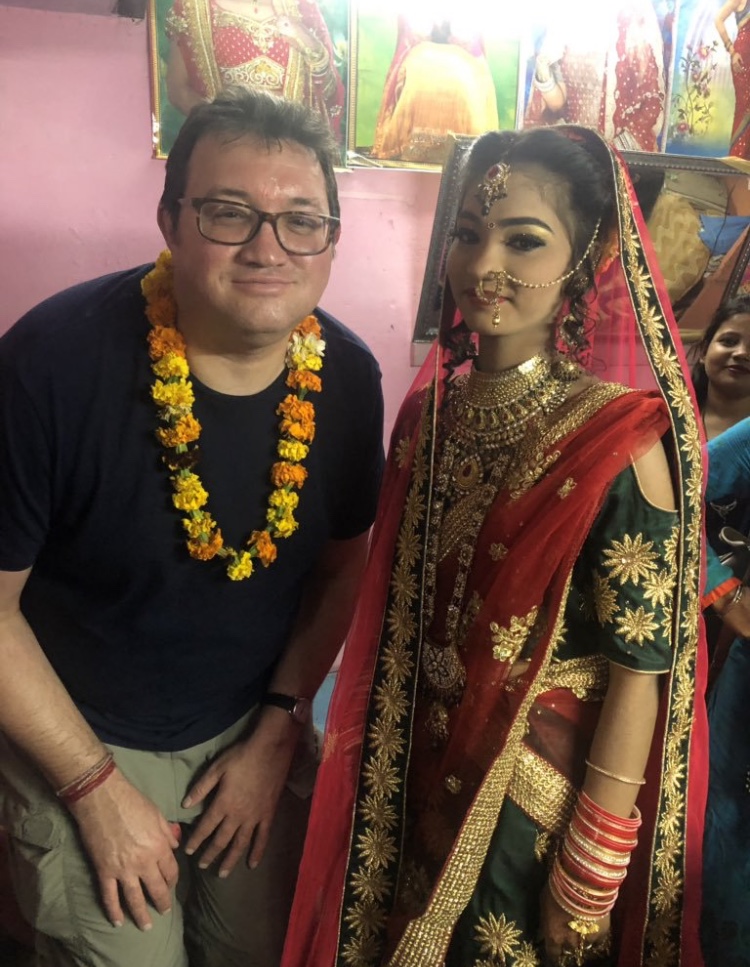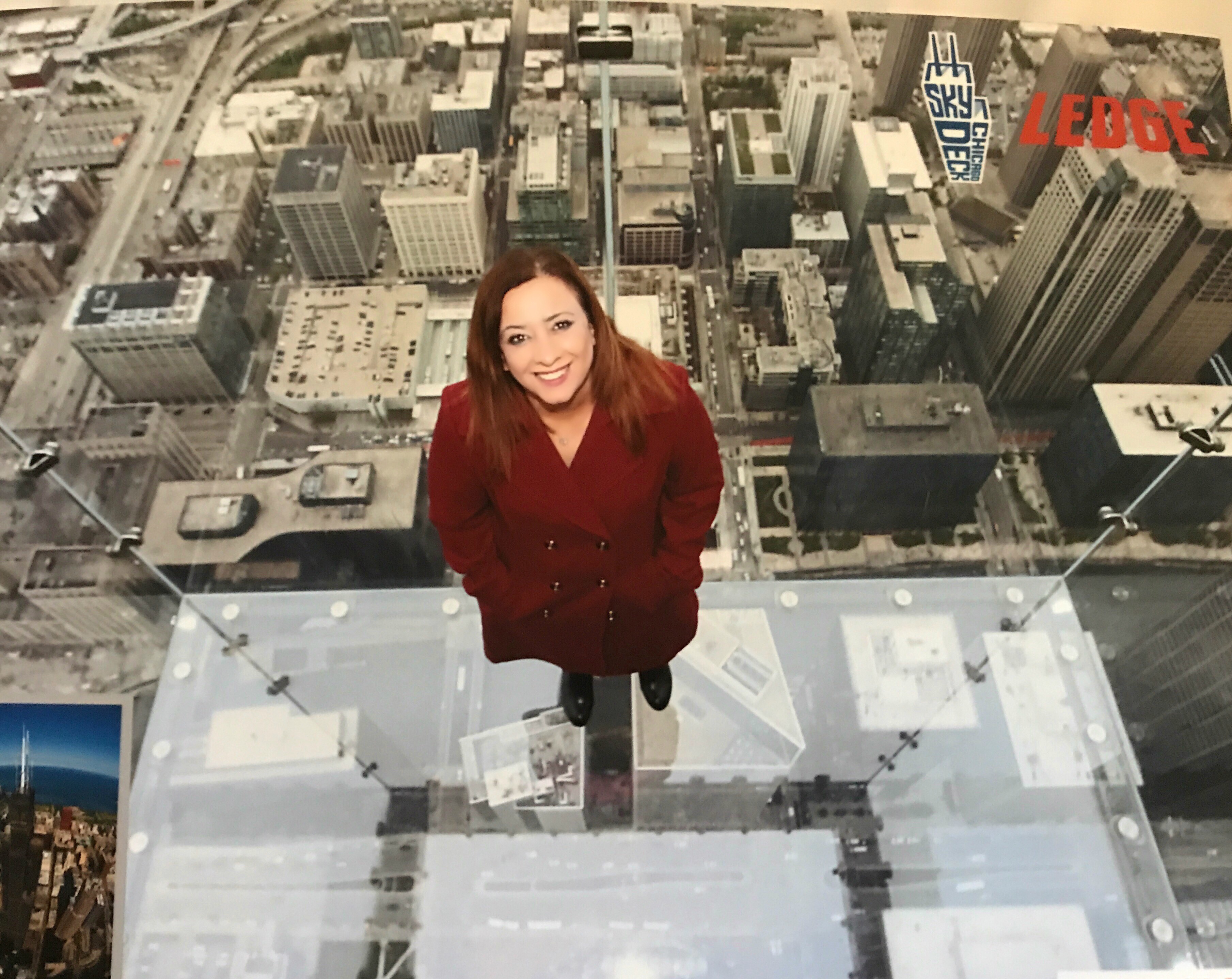
Tell me about yourself?
I hate talking about myself as an introvert-extrovert type. I am a Religious Studies & Philosophy faculty at an independent college-prep school in San Diego, where I am also Director of Global Education. I teach classes on World Religions, Biblical Literature, Philosophy of Human Rights, and Philosophy of Religion. I taught Theology & Religious Studies as an adjunct professor for 16 years. I’ve also worked as a grant-writer for various nonprofits (focused on local social services, international development and healthcare, and human rights). I grew up in England and came to Southern California in 1997 when I got married. I’ve been divorced five years, and have a 19-year-old son who’s away studying acting and theater directing in New York City. I’m most at home when I’m traveling. I’ve visited 55 countries … but feel like I’m just getting started. I prefer traveling in the developing world and off the beaten track and thrive on the privilege of enjoying local hospitality and the opportunity to see the world through the eyes of others. In my spare time, I love “live” performance of any kind – opera, symphony, theater, concerts, stand-up comedy; and I have a taste for hole-in-the-wall ethnic food places … the weirder, the better. My passion is to broaden the horizons of my students – in the classroom, by teaching them to be critical thinkers when it comes to religion and ethics; and outside the school, through community service trips to the developing world (I’ve taken students to India six times, to Africa twice, and to Cambodia), and locally through an after-school tutoring program with refugee students from Myanmar, South Sudan, the Congo, Iraq and Syria.
Why do you have such a strong desire to help others?
The simplest answer is … that was the example my parents set for me. They’d be shocked if they ever heard that. I should really tell them one of these days before it’s too late. I subscribe to Mark Twain’s view of the matter: “When I was a boy of fourteen, my father was so ignorant I could hardly stand to have the old man around. But when I got to be twenty-one, I was astonished at how much he had learned in seven years.” My parents and I don’t see eye-to-eye on much when it comes to religion and politics – no doubt they think I’m a hopelessly corrupted liberal. But they have lived lives dedicated to the service of others – my father was a social worker specializing in the welfare of abused children, and my mother was a midwife and school nurse. And throughout their lives and into their retirement, they have always put the needs of others in their family, their church, and their local community above their own, in a myriad of ways. The older I get, the more I realize that the apple hasn’t fallen far from the tree.
I grew up in England as a fundamentalist Evangelical Baptist … and suffered a crisis of faith in college when challenged by dissenting intellectual arguments. I was fortunate to have an Anglican (Episcopalian) priest as a mentor who helped me evolve my beliefs and faith to a place where I was comfortable with my doubts and questions. My faith expresses itself most emphatically in social justice work and community service. Doctrines and dogmas matter a lot less to me than actions and commitments of time, talent and treasure. If you want to know what someone believes, look at what they do. When Jesus of Nazareth spoke about the great judgment, he didn’t talk about special knowledge or creeds or sacred passwords or hot-button social-political issues – he wanted to know who had fed the hungry, given a drink to the thirsty, offered hospitality to the homeless, welcomed the stranger, cared for the sick or visited the person who was imprisoned. “Truly I tell you, just as you did it to one of the least of these who are members of my family, you did it to me.” (Matthew 25:40)

Was there a turning point in your life where you decided that you wanted to dedicate your life to helping others, or was it just always there?
I don’t think I have dedicated my life to helping others. To be frank, I think of myself as naturally indolent and selfish. Anything I do to help others is a conscious effort to cultivate the better angels of my nature. It’s like creating muscle memory for your conscience. But the gravitational pull of the self is always secure, drawing all into its egotistical orbit. “Life is lived forwards, but understood backward.” (Kierkegaard) Perhaps one could identify a pattern, looking back on your own personal odyssey. But I cannot think of any specific turning point, per se. I was lucky that unforeseen circumstances in my life pushed me into the sphere of grant writing for nonprofit organizations that were full of dedicated, altruistic, inspiring people that exposed me to the challenges faced by people battling a whole host of serious problems, of a personal and structural nature: dually diagnosed homeless veterans battling addiction and mental illness; emancipated foster youth with no support system; women who had mustered the courage to escape domestic violence; malnourished mothers and children in Bolivia; street and working children living under the platforms of train stations in India; survivors of torture seeking asylum in the United States. Once you see such things, meet those people, hear their stories, see the world through their eyes … you cannot “un-see” such things. If you ignore it, you’re lost. But if you make yourself vulnerable, and they change your heart, then you can be transformed … and a fire is ignited inside of you, an urgency … a commitment not just to pull the drowning person out of the river, but also a desire to look upstream and see who’s throwing them in … and righteous indignation.
You have been an educator for a long time; what do you think is the most important thing that kids today should understand?
I asked my students this question, and they gave a variety of what were, for the most part, rather unimaginative answers … about how to do well on assessments and get good grades … mundane process and procedural responses. I guess they don’t know what they don’t know. I want to think that they had a more ambitious vision for what their education might constitute. Teaching as I do in an independent college prep school, it feels like they know they’re in a “game” in which they are trying to make themselves as attractive as possible to elite colleges by creating an academic profile and personal avatar in their applications that they believe such colleges will find appropriately irresistible … and they’re terrified of violating the “rules” of that game. So … I suppose that the most important thing that I would like them to understand is the need to be authentic and genuine as they go through life – to not try to be what other people and institutions might want them to be like, but to find their own way, pursue their own passions, be unafraid of standing out from the crowd, to be courageous enough to dissent, question received wisdom, think critically about paradigms and the status quo, and dream of what might be rather than unquestioningly accept what is. Reformers accomplish almost all progress in religion and philosophy with that kind of mindset.
You do a lot of work overseas, why is that important to you?
The following quotes govern my philosophy of travel:
- “Travel is fatal to prejudice, bigotry, and narrow-mindedness, and many of our people need it sorely on these accounts. Broad, wholesome, charitable views of men and things cannot be acquired by vegetating in one little corner of the earth all one’s lifetime.” (Mark Twain)
- “The world is a book, and those who do not travel read only one page.” (St. Augustine)
- “I am a human being, and thus nothing human is alien to me.” (Terence)
- “Tourists don’t know where they’ve been; travelers don’t know where they’re going.” (Paul Theroux)
- “Go to the people. Live with them. Learn from them. Love them. Start with what they know. Build with what they have. But with the best leaders, when the work is done, the task accomplished, the people will say: ‘We have done this ourselves.'” (Lao Tzu)
Are you a creation of your past, or are you evolving every day?
“Every saint has a future. Every sinner has a past.” (Oscar Wilde) The opportunity to begin again is grace. To be a prisoner of your past is a tragedy … as is a failure to adapt and change and grow in positive ways. Maturity comes with learning to value what is constructive and positive in your past and holding fast to such things. But one also needs to free oneself from the wrongs and inequities of the past that condition unhealthy beliefs and behaviors. Everything evolves and changes – all living organisms, but also cultures, civilizations, religions, political systems, ethical values. Hopefully, the trajectory is onward and upward towards a perfect version of itself.
If there is one thing that you could change about the way marginalized communities are perceived, what would that be?
That all human beings have infinite inherent dignity. We spend a lot of time in my class on Introduction to the Philosophy of Human Rights discussing this word, which is used so frequently in many Human Rights declarations. It’s the sort of word that you think you know intuitively – but if someone pressed you to offer a definition, you might hesitate and stumble in capturing what you know in your heart in words. I love etymology (the study of the origin and evolution of words) – and “dignity” is connected to the idea of a “dignitary” (a person of high social standing), and the way such a person is expected to behave (being “dignified”). But the class consciousness in the word is underpinned by its Latin root – “digitas,” which means finger. You count with your fingers. It’s how you measure a thing’s value as you haggle in the marketplace. The meaning of dignity is about something’s – or someone’s – worth. In times past, some people may have been considered more worthy because of their wealth and power, or a title, or their prestige, or their accomplishments, or their celebrity. In the Judeo-Christian tradition, human beings are considered precious and unique because they are made in “the image of God.” Jesus urged his followers to pay particular attention to those who were considered to be “worthless” – the poor, the diseased, the mentally ill, the homeless, the foreigner, the marginalized, and the persecuted – precisely because they were the recipients of God’s particular concern … which stood the idea of “dignity” based on the social status on its head. The great German Enlightenment philosopher Immanuel Kant secularized the concept of “dignity” by claiming all humans possess it inherently because they are innately rational beings who ought to be treated not as a means to an end but as ends in themselves … and it is this definition that undergirds all modern human rights discourse. I believe all human beings possess infinite, inherent, inalienable dignity. We may treat others in undignified ways … through our apathy and selfishness and disdain. But that detracts from our dignity. It ought not to in any way invalidate the dignity of others.

Who is your hero?
I’m generally pretty skeptical of hero-worship … everyone has feet of clay and Achilles’ heels … and a person’s flaws and character defects can sometimes be as fascinating as their more transcendent qualities. I am constantly amazed by people who show a tremendous capacity to forgive those who have wronged them. Nelson Mandela forgiving his jailers from Robben Island and inviting them to his inauguration. Jesus crying out on the cross: “Father, forgive them, for they know not what they do …” The will to dominate, control, and coerce seems to me to be a pitiful sign of weakness and insecurity. The heroic imagination is the one that empathizes, revealing itself in self-sacrificial compassion and service to others and unconditional forgiveness. Like the old Zen parable, I tend to carry around personal insults and wrongs done to me like dead-weights slung over my shoulder. It’s very petty and pathetic. I’m always amazed by those who can transcend such things … and transfigure the iniquity done to them into something beautiful and brilliant and bountiful. On a day to day level, my hero is Stephen Colbert. I begin every class I teach with a video clip from The Colbert Report, and his satirical Comedy Central show that ran from 2005-2014, in which he plays a parody of an opinionated blowhard right-wing pundit. If you can make people laugh, you can make people listen. He now plays himself on The Late Show on CBS – and his combination of trenchant, passionate political critique, a lightening-fast razor-sharp wit, self-deprecating humor, passion, esoteric erudition, humane compassion, and spirituality (he’s a devout Catholic) is the fuel that keeps me going during dark days.
What’s your favorite memory of working with underprivileged families- locally and internationally?
For almost fifteen years, I have been visiting and working with a Shelter Home for street and working children near Delhi in India. I first visited the program in 2005, when I worked for PCI Global, an international development agency based in San Diego that operates the program. The Shelter Home is full of boys who tragically end up on the streets of Delhi – they may have run away from an abusive home, or been orphaned, or were sold into economic or sexual slavery … or just got lost in the busy city. [These are the children in the movies Slumdog Millionaire (2008) and Lion (2016).] I’ve been taking students from my school to visit and volunteer at the Shelter Home program every two years since 2008, and we just had our sixth trip this spring. We’ve raised over $300,000 to support the program, making us their largest donor and supporter over the last decade. Over that time, I’ve seen boys at the Shelter Home grow up … at first shy and frightened five and six-year-olds who had experienced unimaginably harrowing trauma, who have nevertheless, in a loving communal environment, have matured and developed into remarkably poised, fun-loving, accomplished, generous and compassionate young men. Some of them are now students in college, apprentices in businesses, serving in the armed forces, entrepreneurs … thriving, self-sufficient human beings. Each time we visit, a few of the alums of the program come back to see us … and it’s moving to think of the young children they once were compared to the amazing young men that they are now. Undoubtedly many of them would have died on the streets – through disease, addiction, violence – without the life-saving and life-transforming sanctuary provided by the Shelter Home.
Along with my wonderful son, who I’m immensely proud of, nothing gives me more joy in life than spending time at the Shelter Home and empowering my students to see the difference they can make in the lives of others. Those young boys, adolescents, and the remarkable men that they become are my greatest teachers in life. They give me inexhaustible hope.
Favorite quote?
“We are all in the gutter … but some of us are looking at the stars.”
Oscar Wilde
“Ever tried. Ever failed. No matter. Try again. Fail again. Fail better.”
Samuel Beckett
An educator, a world traveler and a dear friend, Dr. Moseley.

